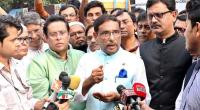 Bangladesh is pursuing its Military Forces Goal 2030 to modernize its defence force. Many countries want to be a part of it and are engaged with the government to sell high-tech defence equipment. Even some of them are sending their senior political leaders to discuss the issue with the government. French Defence Minister Florence Parly came to Dhaka on Mar 9 while US Indo-Pacific Security Affairs Secretary Randall G Schriver also paid a visit last year.
Bangladesh is pursuing its Military Forces Goal 2030 to modernize its defence force. Many countries want to be a part of it and are engaged with the government to sell high-tech defence equipment. Even some of them are sending their senior political leaders to discuss the issue with the government. French Defence Minister Florence Parly came to Dhaka on Mar 9 while US Indo-Pacific Security Affairs Secretary Randall G Schriver also paid a visit last year.
The seller countries have proposed several defence related deals to move the negotiation forward. The countries which proposed the deals include the United States, Italy, France, the Netherlands and UK-Germany-Spain-Italy coalition.
When asked, former foreign secretary M Shahidul Haque told Bangla Tribune, “When a country prospers, it tries to emphasise on the development of all sector. Economic development, infrastructure, education, health, defence capacity and other related sectors get due importance as these are inter-related.”
He said, “This cannot be a policy that a country will strengthen its military capacity after developing other social and economic sectors.”
Shahidul said, “The country achieved tremendous progress in poverty alleviation, infrastructure development, health, education and other sector in the last 10 years under the leadership of Prime Minister Sheikh Hasina and defence cannot be left alone.”
Not only that, Bangladesh is implementing strategic project like Padma bridge with its own financing, he added.
The government has long-term policy to increase defence capacity, he said adding, “Most of the arms we purchase are used in UN peacekeeping mission.”
Bangladesh buys most of its arms from China due to price factor while the developed countries sell high-end products which are relatively expensive.
When asked about the issue, the former foreign secretary said, “Price is not the only determining factor when we buy arms. Many other issues are related to it.”
When asked about the factors that determine the buying, he said, “The long-term government policy, effectiveness of the arms in Bangladesh, use in UN peacekeeping operations, price, geo-politics and other issues.”
What role geo-politics plays in arms trade, he said, “Every issue has geo-political implication. We buy from China, US, UK, Russia, France and many other countries.”
According to Stockholm International Peace Research Institute, Bangladesh bought about $3.5 billion worth of arms during 2009 to 2019. Out of the total sales, China alone sold about $2.6 billion. The distantly second and third countries are Russia ($460 million) and US ($110 million).
Bangladesh bought ships worth $1.4 billion, $940 million armoured vehicle, about $600 million aircraft and $210 million missiles.
(In million dollars)
| 2009 | 2010 | 2011 | 2012 | 2013 | 2014 | 2015 | 2016 | 2017 | 2018 | 2019 | Total |
Austria |
|
|
|
|
|
|
|
|
|
| 1 | 1 |
Canada |
|
|
|
|
|
|
|
|
|
|
| 2 |
China |
| 13 | 81 | 151 | 488 | 204 | 451 | 261 | 204 | 90 | 644 | 2586 |
Czechia |
|
|
|
|
|
| 8 |
|
|
|
| 8 |
France |
|
|
| 7 | 12 |
| 8 |
| 8 |
| 8 | 43 |
Germany |
|
|
|
| 7 |
|
|
|
|
|
| 7 |
Italy |
|
| 6 | 4 | 12 |
| 12 |
|
| 25 |
| 58 |
Russia |
|
| 28 | 20 | 50 |
| 73 | 149 | 93 |
| 34 | 446 |
Serbia |
|
|
|
| 10 |
| 10 | 9 |
| 27 |
| 56 |
Spain |
|
|
|
|
|
|
|
| 12 |
|
| 12 |
Turkey |
|
|
|
| 3 |
|
|
| 3 | 7 |
| 13 |
Ukraine |
|
| 2 | 2 | 6 | 2 | 17 | 24 |
|
| 1 | 56 |
United Kingdom |
| 23 |
|
|
|
|
|
|
|
| 56 | 79 |
United States |
|
|
|
| 56 |
| 54 |
|
|
|
| 110 |
Total |
| 36 | 117 | 184 | 645 | 206 | 632 | 443 | 322 | 149 | 743 | 3476 |
Source: Stockholm International Peace Research Institute


